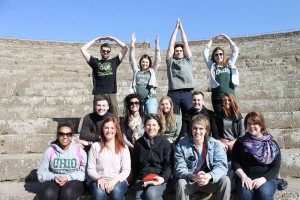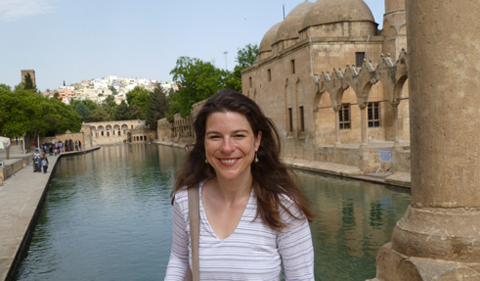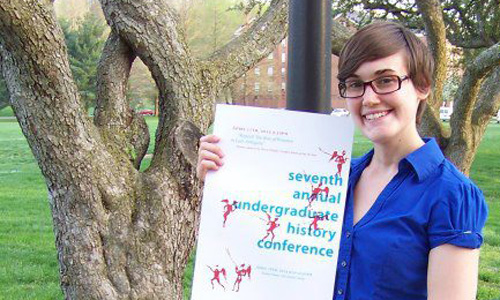The College Arts & Sciences Awards Committee recently awarded Dr. Jaclyn Maxwell, Associate Professor of History at Ohio University, the Dean’s Outstanding Teacher Award.
The award recognizes excellence in teaching across a three-year period, in this case the 2012-13, 2013-14, and 2014-15 academic years. Maxwell holds a joint appointment in the History and Classics & World Religions departments. During the past three years, she has taught a broad array of courses:
- HIST 1210 Western Heritage: Antiquity to 1500
- HIST 3291 Ancient Greece
- HIST 3292 Ancient Rome
- HIST 2950 Introductory History Seminar: Daily Life in the Roman Empire
- CLWR 3450 Self Denial and Religion
- CLWR 3460 Religion and Violence
- CLWR 4820 Thinking about Death

Participants in the Spring Break 2015 Study Abroad Course: HIST 4536 “Eternal Rome,” pictured in Ostia Antica (district).
In Spring 2015, Maxwell designed and led a spring break study abroad program, HIST 4536 (T3E) Eternal Rome: Piety and Power. She also taught a unit on “food and religion” in the team-taught CAS 1400 Food Matters: An Exploration in Food across the Liberal Arts.
A History Department committee nominated Maxwell, whose nomination along with those from other departments and programs was evaluated on the basis classroom performance, involvement with students beyond the classroom, and involvement in department’s curriculum development and in the spectrum of the department’s course offerings. In addition to her teaching record, Maxwell as has been a longtime member of the History Department’s Curriculum Committee, which she officially beings chairing this fall.
Much of Maxwell’s teaching expertise draws on her scholarly work and that of her broader field. Her research focuses on the religious, social, and cultural changes during the later Roman Empire, when Christianity was becoming the dominant religion. In particular, she is interested in social relations between powerful and ordinary people in the context of these changes. Maxwell’s first book, Christianization and Communication in Late Antiquity: John Chrysostom and his Congregation in Antioch (Cambridge University Press, 2006) examines the sermons of an important Christian leader of that period as texts reflecting the concerns and questions of his listeners. She is currently writing a book on upper class Christian leaders’ understandings of social relations and social norms. Most leading bishops and theologians were members of the traditional social, economic, and cultural elite in Roman society. But they tried to model themselves after the apostles (men who had come from lowly social backgrounds) and embraced humility, simplicity, and poverty as Christian virtues. “Needless to say, elite social standing did not fit naturally with these religious teachings,” states Maxwell. Her current research thus examines the tensions between the continuation of the traditional social hierarchy and the Christian challenges to this social hierarchy and how these tensions played out in the careers and writings of prominent Christian leaders.
During the 2015-16 academic year, Maxwell is teaching the following courses:
- HIST 1210 Western Heritage: Antiquity to 1500 (Fall 2015)
- HIST 3292 Ancient Rome (Spring 2016)
- CLWR 3450 Self Denial and Religion: Virgins, Monks, Hermits and other Ascetics (Spring 2016)
- HIST 4536 Eternal Rome (Spring 2016 Spring Break Study Abroad Program)
And she will once again participate in CAS 1410 Food Matters: An Exploration in Food across the Liberal Arts, where she will teach a two-week unit on “food and religion.”




















Comments